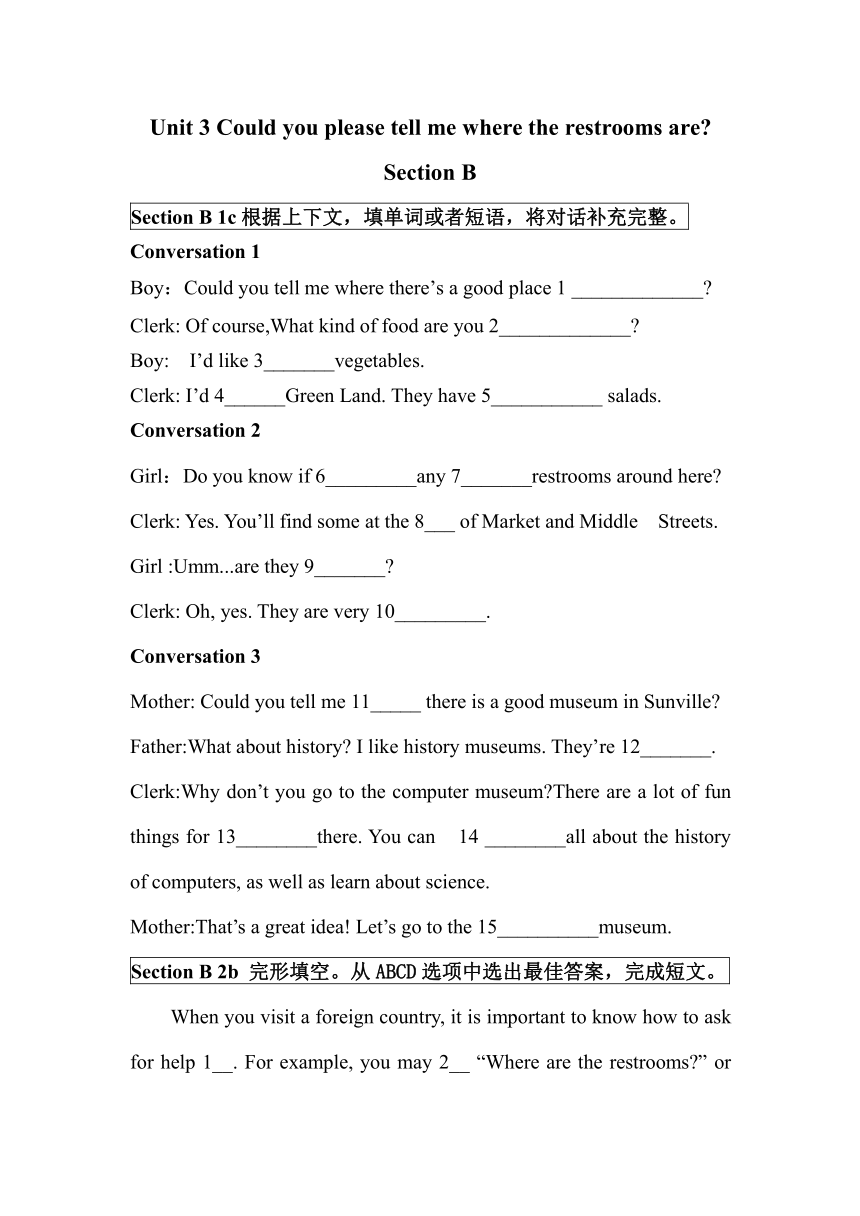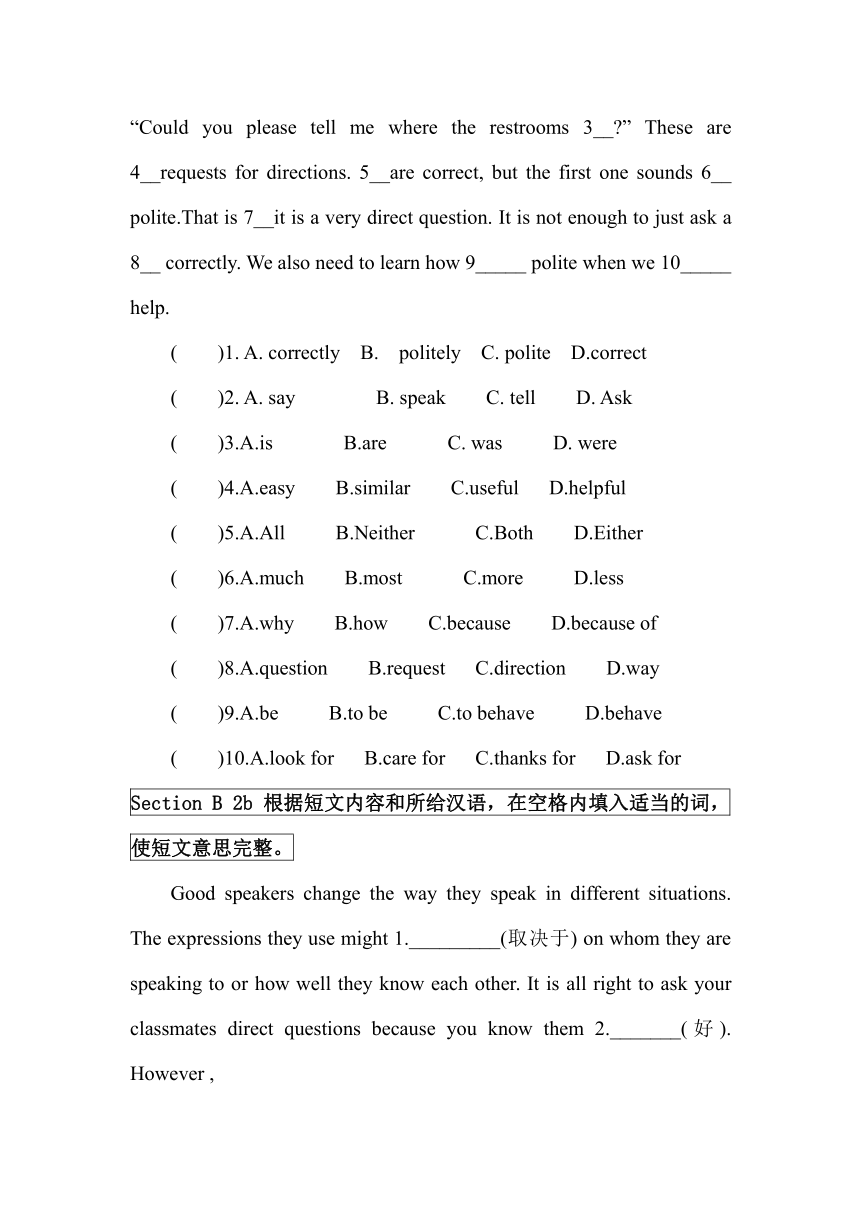Unit3 Could you please tell me where the restrooms are Section B教材改题(无答案)人教版九年级英语全册
文档属性
| 名称 | Unit3 Could you please tell me where the restrooms are Section B教材改题(无答案)人教版九年级英语全册 |  | |
| 格式 | docx | ||
| 文件大小 | 20.6KB | ||
| 资源类型 | 教案 | ||
| 版本资源 | 人教新目标(Go for it)版 | ||
| 科目 | 英语 | ||
| 更新时间 | 2024-08-05 15:03:40 | ||
图片预览


文档简介
Unit 3 Could you please tell me where the restrooms are
Section B
Section B 1c根据上下文,填单词或者短语,将对话补充完整。
Conversation 1
Boy:Could you tell me where there’s a good place 1 _____________
Clerk: Of course,What kind of food are you 2_____________
Boy: I’d like 3_______vegetables.
Clerk: I’d 4______Green Land. They have 5___________ salads.
Conversation 2
Girl:Do you know if 6_________any 7_______restrooms around here
Clerk: Yes. You’ll find some at the 8___ of Market and Middle Streets.
Girl :Umm...are they 9_______
Clerk: Oh, yes. They are very 10_________.
Conversation 3
Mother: Could you tell me 11_____ there is a good museum in Sunville
Father:What about history I like history museums. They’re 12_______.
Clerk:Why don’t you go to the computer museum There are a lot of fun things for 13________there. You can 14 ________all about the history of computers, as well as learn about science.
Mother:That’s a great idea! Let’s go to the 15__________museum.
Section B 2b 完形填空。从ABCD选项中选出最佳答案,完成短文。
When you visit a foreign country, it is important to know how to ask for help 1__. For example, you may 2__ “Where are the restrooms ” or “Could you please tell me where the restrooms 3__ ” These are 4__requests for directions. 5__are correct, but the first one sounds 6__ polite.That is 7__it is a very direct question. It is not enough to just ask a 8__ correctly. We also need to learn how 9_____ polite when we 10_____ help.
( )1. A. correctly B. politely C. polite D.correct
( )2. A. say B. speak C. tell D. Ask
( )3.A.is B.are C. was D. were
( )4.A.easy B.similar C.useful D.helpful
( )5.A.All B.Neither C.Both D.Either
( )6.A.much B.most C.more D.less
( )7.A.why B.how C.because D.because of
( )8.A.question B.request C.direction D.way
( )9.A.be B.to be C.to behave D.behave
( )10.A.look for B.care for C.thanks for D.ask for
Section B 2b 根据短文内容和所给汉语,在空格内填入适当的词,使短文意思完整。
Good speakers change the way they speak in different situations. The expressions they use might 1._________(取决于) on whom they are speaking to or how well they know each other. It is all right to ask your classmates direct questions because you know them 2._______(好). However ,
if you say to your teacher, “When is the school trip ”, this might 3._______(听) impolite. But if you say, “Excuse me, Mr. West. Do you know when the school trip is ” this will sound much more polite.
Usually polite questions are 4._______(长). They include expressions such as “Could you please... ” or “May I ask ... ” It sounds more polite to say , “Peter, could you please tell me your e-mail address ” than “Peter, tell me your e-mail address.” Sometimes we even need to spend time 5._______(引出) into a request. For example, we might first say to a 6._________(陌生人), “Excuse me, I wonder if you can help me” or “I’m sorry to trouble you, but...” before asking for help.
It might seem more difficult to speak 7._________(礼貌) than directly. However, it is 8.__________(重要的) to learn how to use the right language in different situations. This will help you communicate better with other people.
课文翻译及重点词汇回顾
请问你能······吗?
当你去外国( )游玩时,知道如何礼貌地寻求帮助( )很重要。例如,“洗手间在哪里?”或者“请问你能告诉我洗手间在哪里吗?”是相似的( )问路的请求。两种说法都( )正确,但是第一个听起来没那么礼貌( )。那是因为它是一个很直接的问题。仅仅只是正确地问一个问题是不够的。当我们寻求帮助的时候,我们也需要学会如何通过更委婉的方式来显得有礼貌。
英语讲得好的人在不同的情况下( )、与不同的人说话时,他们会改变说话的方式( )。他们所使用的表达可能取决于( )他们说话的对象或者他们对彼此的熟悉程度( )。在某些情况下直接提问没关系,比如对你的同学。但是,如果你对你的老师说:“学校旅行是什么时候?”这可能听上去不礼貌。但是如果你说:“打扰一下,威斯特先生。您知道学校旅行是什么时候吗?”这听起来会礼貌得多。
通常有礼貌的问题更长一点,并且包含( )例如“请问你能......吗?”或“我可以问问......吗?”之类的表达。说“彼得,请问你能告诉我你的电子邮件地址吗?”比说“彼得,告诉我你的电子邮件地址。”听起来更有礼貌。有时,我们甚至需要花时间来引出( )请求。例如,在街上与一个陌生人( )说话,在我们寻求帮助前或许首先会说:“打扰一下,我想知道你是否可以帮帮我。”或者“很抱歉麻烦你,但......”。
礼貌地说话似乎比直白地说话更困难。但是,学习如何使用适当的语言( )很重要。这也会有助于你更好地掌握英语( )或其他任何你想说的语言。
Section B
Section B 1c根据上下文,填单词或者短语,将对话补充完整。
Conversation 1
Boy:Could you tell me where there’s a good place 1 _____________
Clerk: Of course,What kind of food are you 2_____________
Boy: I’d like 3_______vegetables.
Clerk: I’d 4______Green Land. They have 5___________ salads.
Conversation 2
Girl:Do you know if 6_________any 7_______restrooms around here
Clerk: Yes. You’ll find some at the 8___ of Market and Middle Streets.
Girl :Umm...are they 9_______
Clerk: Oh, yes. They are very 10_________.
Conversation 3
Mother: Could you tell me 11_____ there is a good museum in Sunville
Father:What about history I like history museums. They’re 12_______.
Clerk:Why don’t you go to the computer museum There are a lot of fun things for 13________there. You can 14 ________all about the history of computers, as well as learn about science.
Mother:That’s a great idea! Let’s go to the 15__________museum.
Section B 2b 完形填空。从ABCD选项中选出最佳答案,完成短文。
When you visit a foreign country, it is important to know how to ask for help 1__. For example, you may 2__ “Where are the restrooms ” or “Could you please tell me where the restrooms 3__ ” These are 4__requests for directions. 5__are correct, but the first one sounds 6__ polite.That is 7__it is a very direct question. It is not enough to just ask a 8__ correctly. We also need to learn how 9_____ polite when we 10_____ help.
( )1. A. correctly B. politely C. polite D.correct
( )2. A. say B. speak C. tell D. Ask
( )3.A.is B.are C. was D. were
( )4.A.easy B.similar C.useful D.helpful
( )5.A.All B.Neither C.Both D.Either
( )6.A.much B.most C.more D.less
( )7.A.why B.how C.because D.because of
( )8.A.question B.request C.direction D.way
( )9.A.be B.to be C.to behave D.behave
( )10.A.look for B.care for C.thanks for D.ask for
Section B 2b 根据短文内容和所给汉语,在空格内填入适当的词,使短文意思完整。
Good speakers change the way they speak in different situations. The expressions they use might 1._________(取决于) on whom they are speaking to or how well they know each other. It is all right to ask your classmates direct questions because you know them 2._______(好). However ,
if you say to your teacher, “When is the school trip ”, this might 3._______(听) impolite. But if you say, “Excuse me, Mr. West. Do you know when the school trip is ” this will sound much more polite.
Usually polite questions are 4._______(长). They include expressions such as “Could you please... ” or “May I ask ... ” It sounds more polite to say , “Peter, could you please tell me your e-mail address ” than “Peter, tell me your e-mail address.” Sometimes we even need to spend time 5._______(引出) into a request. For example, we might first say to a 6._________(陌生人), “Excuse me, I wonder if you can help me” or “I’m sorry to trouble you, but...” before asking for help.
It might seem more difficult to speak 7._________(礼貌) than directly. However, it is 8.__________(重要的) to learn how to use the right language in different situations. This will help you communicate better with other people.
课文翻译及重点词汇回顾
请问你能······吗?
当你去外国( )游玩时,知道如何礼貌地寻求帮助( )很重要。例如,“洗手间在哪里?”或者“请问你能告诉我洗手间在哪里吗?”是相似的( )问路的请求。两种说法都( )正确,但是第一个听起来没那么礼貌( )。那是因为它是一个很直接的问题。仅仅只是正确地问一个问题是不够的。当我们寻求帮助的时候,我们也需要学会如何通过更委婉的方式来显得有礼貌。
英语讲得好的人在不同的情况下( )、与不同的人说话时,他们会改变说话的方式( )。他们所使用的表达可能取决于( )他们说话的对象或者他们对彼此的熟悉程度( )。在某些情况下直接提问没关系,比如对你的同学。但是,如果你对你的老师说:“学校旅行是什么时候?”这可能听上去不礼貌。但是如果你说:“打扰一下,威斯特先生。您知道学校旅行是什么时候吗?”这听起来会礼貌得多。
通常有礼貌的问题更长一点,并且包含( )例如“请问你能......吗?”或“我可以问问......吗?”之类的表达。说“彼得,请问你能告诉我你的电子邮件地址吗?”比说“彼得,告诉我你的电子邮件地址。”听起来更有礼貌。有时,我们甚至需要花时间来引出( )请求。例如,在街上与一个陌生人( )说话,在我们寻求帮助前或许首先会说:“打扰一下,我想知道你是否可以帮帮我。”或者“很抱歉麻烦你,但......”。
礼貌地说话似乎比直白地说话更困难。但是,学习如何使用适当的语言( )很重要。这也会有助于你更好地掌握英语( )或其他任何你想说的语言。
同课章节目录
- Unit 1 How can we become good learners.
- Section A
- Section B
- Unit 2 I think that mooncakes are delicious!
- Section A
- Section B
- Unit 3 Could you please tell me where the restroom
- Section A
- Section B
- Unit 4 I used to be afraid of the dark.
- Section A
- Section B
- Unit 5 What are the shirts made of?
- Section A
- Section B
- Review of Units 1-5
- Unit 6 When was it invented?
- Section A
- Section B
- Unit 7 Teenagers should be allowed to choose their
- Section A
- Section B
- Unit 8 It must belong to Carla.
- Section A
- Section B
- Unit 9 I like music that I can dance to.
- Section A
- Section B
- Unit 10 You're supposed to shake hands.
- Section A
- Section B
- Review of Units 6-10
- Unit 11 Sad movies make me cry.
- Section A
- Section B
- Unit 12 Life is full of the unexpected
- Section A
- Section B
- Unit 13 We're trying to save the earth!
- Section A
- Section B
- Unit 14 I remember meeting all of you in Grade 7.
- Section A
- Section B
- Review of Units 11-14
